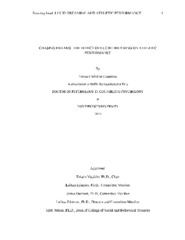| dc.contributor.author | Grummer, Tressa Christine | en |
| dc.date.accessioned | 2019-12-19T19:23:33Z | |
| dc.date.available | 2019-12-19T19:23:33Z | |
| dc.date.issued | 2019 | en |
| dc.identifier.uri | archives.northwestu.edu/handle/nu/46586 | en |
| dc.description.abstract | While many researchers have investigated the use of mental imagery to improve performance during wakefulness, the research in regards to using mental imagery while dreaming is still insufficient. A lucid dream is a dream in which the dreamer becomes aware they are dreaming and can sometimes gain control over the dream (Erlacher & Schredl, 2008). Previous researchers have shown psychological responses when people lucid dream about tasks, suggesting that lucid dreaming can be used as a technique to improve performance. The purpose of this study was to examine the effect of mental imagery during lucid dreaming on one's athletic performance. It was hypothesized that if an individual uses mental imagery during lucid dreaming, their athletic performance in sprinting will increase. It was also hypothesized that if an individual uses mental imagery during lucid dreaming, their athletic performance will increase more than an individual using mental imagery during an awake state. The participants (n = 48) were both males (24) and females (24), ranging in age from 26-66. They were randomly assigned into one of three groups: (1) Lucid dreaming group, (2) Mental practice group, and (3) Control (no practice) group. They recorded a timed 40 yard sprint before and after the study. They used their assigned form of practice for 30 days. The mental imagery group had a two percent increase in speed, the control group had a three percent increase in speed, and the lucid dreaming group had a four percent increase in speed. However, statistical analysis determined that there was no statistically significant difference between the groups and more research is needed in order to draw any direct conclusions. Future research would benefit from having a larger number of participants that were higher level athletes in order to increase motivation and consistency in participants. | en |
| dc.format.extent | 71 pages | en |
| dc.format.medium | PDF | en |
| dc.language.iso | en | en |
| dc.publisher | Northwest University | en |
| dc.rights | This original work is protected by copyright. Copyright is retained by the author(s). Works may be viewed, downloaded, or printed, but not reproduced or distributed without author(s) permission. | en |
| dc.rights.uri | http://archives.northwestu.edu/page/copyright | en |
| dc.subject | Lucid dreams | en |
| dc.subject | Athletes | en |
| dc.title | Chasing Dreams: The Effect of Lucid Dreaming on Athletic Performance | en |
| thesis.degree.name | Doctor of Psychology in Counseling Psychology | en |
| thesis.degree.level | Doctoral | en |
| thesis.degree.grantor | Northwest University | en |
| thesis.degree.discipline | College of Social and Behavioral Sciences | en |


 Maintained by the Northwest University Library
Maintained by the Northwest University Library